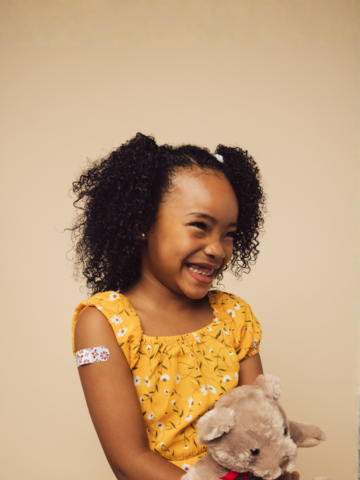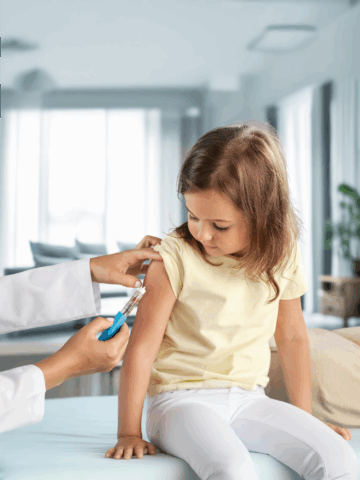With children ages 12 -15 years and teens ages 16 years and older now eligible to receive the COVID-19 vaccine, parents may have questions about the vaccine and what to expect afterward.

Here, Dr. Angela Dangvu, a pediatrician in the CHOC Primary Care Network, answers some common questions about the vaccine, teens and kids.
The Pfizer vaccine and Modern vaccines are authorized for emergency use teens ages 12 to prevent COVID-19. Both vaccines are administered in two doses three to four weeks apart, injected into the arm muscle.
The Pfizer vaccine, as well as the Moderna vaccine, is an mRNA vaccine. When the vaccine is injected, mRNA – a strip of genetic material – enters a body’s cell and prompts the cell to build copies of spike proteins. These spike proteins are the bumps that protrude from the surface of coronavirus particles. The body’s immune system then learns to spot these spike proteins and produces antibodies that block the virus from entering healthy cells in the future.
Studies show that vaccine recipients achieve immunity about two weeks after receiving the vaccine’s second dose. Scientists are still learning about how long that immunity will last.
Both Pfizer and Moderna have vaccines authorized for kids in the 5 to 11-year range, and kids under 5.
The Pfizer and Moderna vaccines are absolutely safe for children over 12 years. In clinical trials, enough teens and children participated to show that the vaccine is safe for 12-year-olds and older. We have no reason to expect that children would tolerate the vaccine less favorably than adults would.
As of 2025, our practice aligns with the American Academy of Pediatrics (AAP), the leading professional organization representing pediatricians in the United States. The AAP continues to recommend COVID-19 vaccination for children because vaccination remains the most effective way to reduce the risk of severe illness, hospitalization, and complications from COVID-19.
If you have questions about whether the vaccine is right for your child, we encourage a conversation with your pediatrician so you can make an informed, personalized decision.
Even though it is rare for children to get seriously ill from COVID-19, children who are 12 years and older have needed hospital care for COVID-19. This is especially true for children and teenagers with underlying health conditions such as weakened immune systems, obesity or chronic lung conditions. Having the vaccine may also give parents, teens and kids alike peace of mind to return to more typical activities like in-person instruction and participating in sports, which is great for mental health.
There is no category of children or teenagers who shouldn’t get the vaccine, unless they have a known allergy to one of the vaccine’s components. Because it isn’t a live vaccine – a vaccine that uses a weakened form of a germ to prompt an immune response – people with weakened immune systems, either from illness or medication, may still receive the vaccine. There have been reports allergic reactions to the vaccine, but these occurrences are very rare. Vaccine recipients are monitored for 15 minutes after receiving the injection in case of any allergic reaction, and anyone with a history of severe allergic reactions to foods or medications (who carry an epinephrine auto-injector) are monitored for 30 minutes. Children and teens with other types of allergies beyond any vaccine component can feel safe receiving the vaccine.
Parents are always encouraged to speak with their teen’s or child’s pediatrician if they have any questions or concerns.
Definitely not. Because it is an mRNA vaccine (see explanation above), the vaccine does not get incorporated into or change the DNA of the body’s cells in any way. There is no reason to worry that the vaccine will affect fertility or future offspring. Read about this in more detail here.
Myocarditis, or inflammation of the heart muscle, appears to be a very rare side effect of the mRNA COVID-19 vaccine. Get detailed information about that here.
No. The vaccine was developed quickly because scientists received additional money and resources and support from the government. This allowed scientists to follow all the typical processes but overlap some steps, which sped up the process. Also, it was easy to find volunteers to participate in clinical trials because many were excited by the possibility of receiving the vaccine. None of these factors compromised the quality of the trials, and the same processes for safety and effectiveness was followed.
We are still learning about how effective the vaccine is against variants. While there may be some decrease in immune response, the vaccine is still largely protective. An important step in fighting variants is to ensure as many people as possible get the vaccine. The more people who get sick – even mildly – with COVID-19, the more opportunity is presented for the virus to continue to mutate.
Yes. We don’t know how long the immunity lasts from natural illness, and the vaccine is made to create a longer lasting immune response.
Your child or teen should wait until they are feeling better and no longer need to isolate based on guidelines from the Centers for Disease Control.
Your child or teen should wait 90 days to get the vaccine after receiving convalescent plasma or monoclonal antibody treatments. Your child’s pediatrician can help you determine when it’s appropriate to get the vaccine.
Your child should continue to take their normal medications as prescribed.
No. It is best to avoid preventatively administering these medications – either before the vaccination or right afterward if no side effects are present – because there is a chance they can decrease the immune response.
Yes. Anyone under 18 must have a parent or legal guardian present to receive the vaccine.
Bring photo ID, such as one from school or the government, and a document verifying your child’s date of birth, such as a birth certificate or a medical visit summary with their name and date of birth. There’s no need to bring your child’s vaccine records, as they will receive a card specific to the COVID-19 vaccine. It would be helpful if the teen or child wears a short-sleeved shirt, as the injection is administered into the arm.
After checking in and taking care of paper work, the teen or child will be asked some questions about their health. The shot will be administered into the arm. After receiving the shot, the teen or child will be monitored for 15 minutes to ensure no adverse reactions. They will also receive a card indicating when they received the vaccine and information about the vaccine.
Take a picture of it just in case and store in a safe place. There is no need to laminate it.
Yes. Clinical trials that led to the Pfizer and Moderna vaccine’s licensing incorporated two doses. So, the determined efficacy is based on two doses and we don’t yet know how effective one dose alone is. The Johnson & Johnson/Janssen vaccination is administered in one dose, but at this time it is only approved for people ages 18 and older.
The most common side effects are fever and feeling achy or tired. Any side effects should be relatively short-lived and ease within 24 hours. Because teens and children have more robust immune systems, it’s possible that they may feel these side effects more strongly than adults would. This is a sign that their immune system is mounting a response against the virus.
It is fine to treat side effects once they surface with over-the-counter pain medicine. Either ibuprofen or acetaminophen is fine, so long as the child hasn’t had previous reactions to these medications.
If they have a fever, the teen or child should stay home. Beyond that, so long as they are feeling well, there is no need to limit activities.
The U.S. Centers for Disease Control & Prevention has updated its guidance and recommends that fully vaccinated people who have a known exposure to someone with suspected or confirmed COVID-19 to be tested three to five days after exposure, and wear a mask in public indoor settings for 14 days or until they receive a negative test result.
No. It’s important that they continue to take precautions against COVID-19. Though they are highly effective, the vaccine is not 100 percent effective, and while among a group of people, it’s impossible to know who is and who isn’t vaccinated.
Teens, children and families alike can definitely have more peace of mind about the safety of resuming more typical activities, which will be wonderful for mental health. In group activities, kids ages 12-15 and teens 16 and older should still continue to wear masks. In one-on-one activities where a child or teen and their friend are fully vaccinated, they can feel comfortable removing their masks so long as no one in either household is high-risk and unvaccinated.
Updated June 24, 2022
Get more expert health advice delivered to your inbox monthly by subscribing to the KidsHealth newsletter here.
Learn more about COVID Vaccines for Children and Teens
Get answers to your frequently asked questions – and some peace of mind – with this complete guide to COVID-19 vaccines from CHOC pediatric experts.





